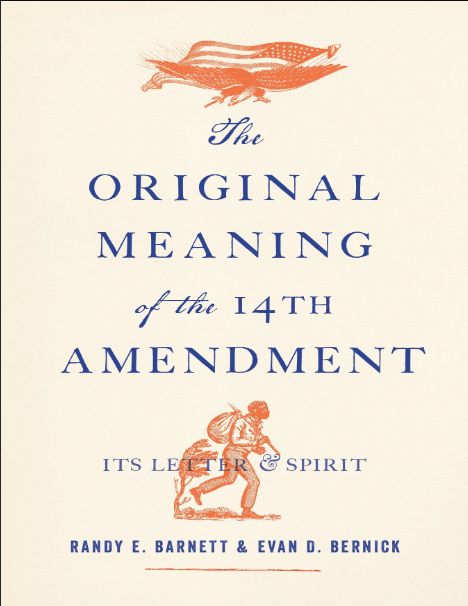Newly released
This book is new and will be uploaded as soon as it becomes available to us and if we secure the necessary publishing rights.

The Original Meaning of the Fourteenth Amendment: Its Letter and Spirit Book PDF
(0)
Author:
Randy BarnettNumber Of Reads:
116
Language:
English
Category:
Social sciencesSection:
Pages:
790
Quality:
excellent
Views:
1246
Quate
Review
Save
Share
New
Book Description
A renowned constitutional scholar and a rising star provide a balanced and definitive analysis of the origins and original meaning of the Fourteenth Amendment.
Adopted in 1868, the Fourteenth Amendment profoundly changed the Constitution, giving the federal judiciary and Congress new powers to protect the fundamental rights of individuals from being violated by the states. Yet, according to Randy Barnett and Evan Bernick, the Supreme Court has long misunderstood or ignored the original meaning of the amendment's key clauses, covering the privileges and immunities of citizenship, due process of law, and the equal protection of the laws.
Barnett and Bernick contend that the Fourteenth Amendment was the culmination of decades of debates about the meaning of the antebellum Constitution. Antislavery advocates advanced arguments informed by natural rights, the Declaration of Independence, and the common law. They also utilized what is today called public-meaning originalism. Although their arguments lost in the courts, the Republican Party was formed to advance an antislavery political agenda, eventually bringing about abolition. Then, when abolition alone proved insufficient to thwart Southern repression and provide for civil equality, the Fourteenth Amendment was enacted. It went beyond abolition to enshrine in the Constitution the concept of Republican citizenship and granted Congress power to protect fundamental rights and ensure equality before the law. Finally, Congress used its powers to pass Reconstruction-era civil rights laws that tell us much about the original scope of the amendment.
With evenhanded attention to primary sources, The Original Meaning of the Fourteenth Amendment shows how the principles of the Declaration eventually came to modify the Constitution and proposes workable doctrines for implementing the key provisions of Section 1 of the Fourteenth Amendment.
Randy Barnett
Randy E. Barnett is the Carmack Waterhouse Professor of Legal Theory at the Georgetown University Law Center, where he teaches constitutional law and contracts. After graduating from Northwestern University and Harvard Law School, he tried many felony cases as a prosecutor in the Cook County State’s Attorney’s Office in Chicago. He has been a visiting professor at Northwestern and Harvard Law School. In 2008, he was awarded a Guggenheim Fellowship in Constitutional Studies.
In 2004, Barnett appeared before the U.S. Supreme Court to argue the medical cannabis case of Gonzalez v. Raich. He lectures internationally and has appeared on radio and television programs such as the CBS Evening News, PBS NewsHour, Talk of the Nation (NPR), Hannity & Colmes (FOX), and the Ricki Lake Show. He delivered the Kobe 2000 lectures in jurisprudence at the University of Tokyo and Doshisha University in Kyoto.
Barnett’s scholarship includes more than 80 articles and reviews as well as 8 books, including Restoring the Lost Constitution: The Presumption of Liberty (Princeton, 2004), Constitutional Law: Cases in Context (Aspen 2008), Contracts Cases and Doctrine (Aspen, 4th ed. 2008), and Our Republican Constitution: Securing the Liberty and Sovereignty of We the People (Broadside Books, 2016).
Read More
Book Currently Unavailable
This book is currently unavailable for publication. We obtained it under a Creative Commons license, but the author or publisher has not granted permission to publish it.
Rate Now
5 Stars
4 Stars
3 Stars
2 Stars
1 Stars
The Original Meaning of the Fourteenth Amendment: Its Letter and Spirit Quotes
Top Rated
Latest
Quate
Be the first to leave a quote and earn 10 points
instead of 3
Comments
Be the first to leave a comment and earn 5 points
instead of 3